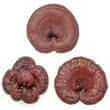Background
- Reishi mushroom (Ganoderma lucidum), also known as ling zhi in China, grows wild on decaying logs and tree stumps. Reishi occurs in six different colors, but the red variety is most commonly used and commercially cultivated in East Asia and North America.
- The reishi mushroom is a derivative of the Far East with its usage dating back to ancient China. Royalty would utilize this precious mushroom in the hopes of obtaining immortality and promoting calmness and thought. Chinese medicine now includes therapy with reishi for fatigue, asthma, insomnia, and cough.
- Ganoderma lucidum has been used in traditional Chinese medicine for more than 4,000 years to treat liver disorders, high blood pressure, arthritis, and other ailments. In modern times, the available data from human trials together with evidence from animal studies suggest that Ganoderma lucidum may have some positive benefits for cancer and liver disease patients. However, the number and quality of trials is very limited. Other promising uses for which there is still inconclusive evidence include diabetes, heart disease, pain, Russula subnigricans poisoning, and proteinuria (protein in the urine). Reishi is also believed to reduce cholesterol levels and has an anticoagulant ("blood-thinning") effect, which may make it useful in coronary heart disease prevention.
- Some experts believe that Ganoderma lucidum promotes longevity and maintains vitality of the human body. Reishi's major benefit appears to be its immunomodulating action, improvement of liver function, and improvement and restoration of the normal functions of the respiratory system. Antioxidant effects, which contribute to the overall well-being of patients, have been proposed. In the 16th Century pharmacopeia Ben Cao Gang Mu, reishi was described as being able to affect the life energy, or qi, of the heart, repair the chest area, increase intellectual capacity, and banish forgetfulness.
- Reishi is currently regulated in the United States as a dietary supplement. It is also included in the 2,000 Pharmacopoeia of the People's Republic of China as an agent approved for the treatment of dizziness, insomnia, palpitations, shortness of breath, cough, and asthma. At this time, high quality clinical trials supporting the use of reishi mushroom are lacking. More proven therapies are recommended at this time.
References
- Cheuk W, Chan JK, Nuovo G, et al. Regression of gastric large B-Cell lymphoma accompanied by a florid lymphoma-like T-cell reaction: immunomodulatory effect of Ganoderma lucidum (Lingzhi)? Int J Surg Pathol 2007 Apr;15(2):180-6.
View Abstract - Eo SK, Kim YS, Lee CK, et al. Possible mode of antiviral activity of acidic protein bound polysaccharide isolated from Ganoderma lucidum on herpes simplex viruses. J.Ethnopharmacol 2000;72(3):475-481.
View Abstract - Futrakul N, Panichakul T, Butthep P, et al. Ganoderma lucidum suppresses endothelial cell cytotoxicity and proteinuria in persistent proteinuric focal segmental glomerulosclerosis (FSGS) nephrosis. Clin Hemorheol Microcirc 2004;31(4):267-272.
View Abstract - Gao Y, Dai X, Chen G, et al. A Randomized, Placebo-Controlled, Multicenter Study of Ganoderma lucidum (W.Curt: Fr.) Lloyd (Aphyllophoromycetideae) Polysaccharides (Ganopoly®) in Patients with Advanced Lung Cancer. International Journal of Medicinal Mushrooms 2003;5.
- Gao Y, Zhou S, Jiang W, et al. Effects of ganopoly (a Ganoderma lucidum polysaccharide extract) on the immune functions in advanced-stage cancer patients. Immunol Invest 2003;32(3):201-215.
View Abstract - Gao Y, Zhou S, Wen J, et al. Mechanism of the antiulcerogenic effect of Ganoderma lucidum polysaccharides on indomethacin-induced lesions in the rat. Life Sci 12-27-2002;72(6):731-745.
View Abstract - Hijikata Y, Yamada S. Effect of Ganoderma lucidum on postherpetic neuralgia. Am J Chin Med 1998;26(3-4):375-381.
View Abstract - Li EK, Tam LS, Wong CK et al. Safety and efficacy of Ganoderma lucidum (lingzhi) and San Miao San supplementation in patients with rheumatoid arthritis: a double-blind, randomized, placebo-controlled pilot trial. Arthritis Rheum 2007 Oct 15;57(7):1143-50.
View Abstract - Lin ZB. Cellular and molecular mechanisms of immuno-modulation by Ganoderma lucidum. J Pharmacol Sci 2005 Oct;99(2):144-53.
View Abstract - Tao J, Feng KY. Experimental and clinical studies on inhibitory effect of ganoderma lucidum on platelet aggregation. J.Tongji Med Univ 1990;10(4):240-243.
View Abstract - Wanachiwanawin D, Piankijagum A, Chaiprasert A, et al. Ganoderma lucidum: a cause of pseudoparasitosis. Southeast Asian J Trop Med Public Health 2006 Nov;37(6):1099-102.
View Abstract - Wanmuang H, Leopairut J, Kositchaiwat C, et al. Fatal fulminant hepatitis associated with Ganoderma lucidum (Lingzhi) mushroom powder. J Med Assoc Thai 2007 Jan;90(1):179-81.
View Abstract - Wicks SM, Tong R, Wang CZ, et al. Safety and tolerability of Ganoderma lucidum in healthy subjects: a double-blind randomized placebo-controlled trial. Am J Chin Med 2007;35(3):407-14.
View Abstract - Xiao GL, Liu FY, Chen ZH. [Clinical observation on treatment of Russula subnigricans poisoning patients by Ganoderma lucidum decoction]. Zhongguo Zhong Xi Yi Jie He Za Zhi 2003;23(4):278-280.
View Abstract







